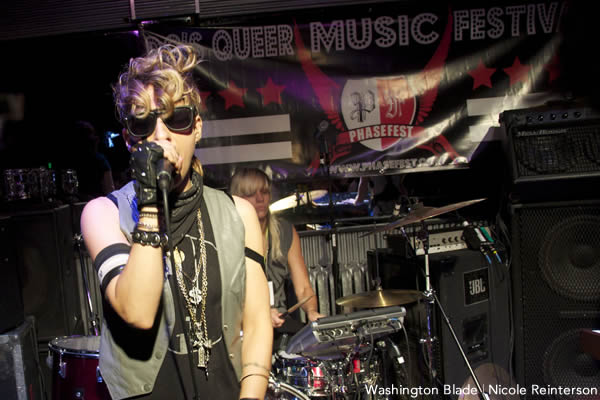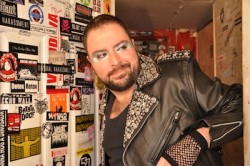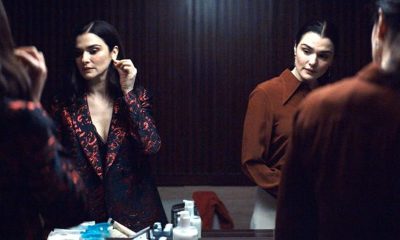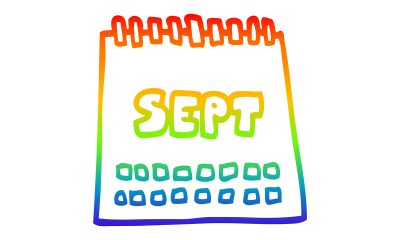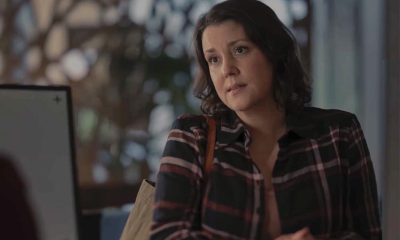Arts & Entertainment
Musical mayhem
Phasefest gives queer bands platform in D.C. this weekend
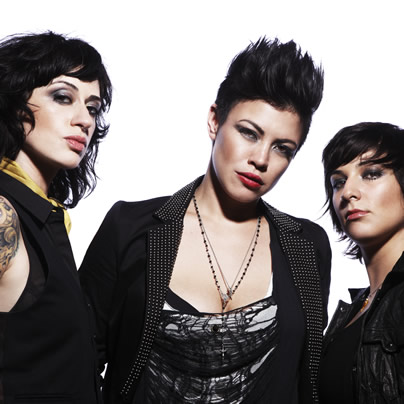
Phasefest
Continues through Saturday
Phase 1
525 8th Street, S.E.
$20 for tonight; $25 for Saturday
Weekend passes available for $55
Tickets available at the door
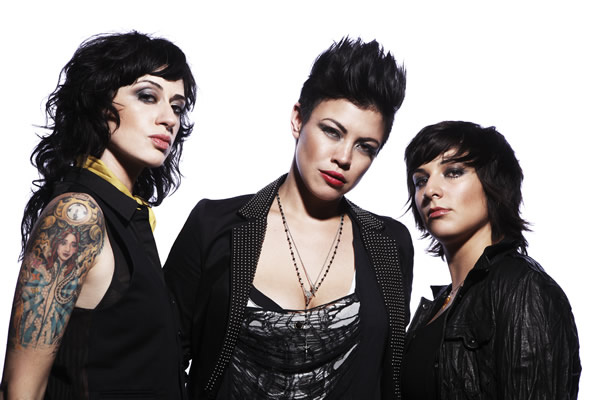
Hunter Valentine is, from left, Vero Sanchez (bass), Kiyomi McCloskey (vocals/guitar) and Laura Petracca (drums). (Photo by Leslie Van Stelten)
Ordinarily Somer Bingham likes to hang out at Phasefest whether she’s playing that night or not.
The musician behind Clinical Trials has played Phasefest the past four years and is up again for a mini-set tonight. During a phone chat this week from West Hollywood where she’s getting ready for a solo show, she says it’s probably best she’s not planning to be at Phasefest on Saturday night. There’s a little drama that’s gone down with her old group, Hunter Valentine, the headline band for Saturday.
“It’s probably best I won’t see them since I just got kicked out of the band,” Bingham says. “I was never technically a full member, but we played together almost six months. They kind of decided I just wasn’t the right fit. Kiyomi (McCloskey, lead singer of Hunter Valentine) and I just weren’t getting along as band mates and it kind of just exploded.”
Fans of the Showtime reality show “The Real L Word” know the story — the drama played out in July and August during the series’ tense third season, a segment of which was filmed at Phase 1 in March.
But the drama should be avoided at Phasefest where the focus will be on the music. For the record, though, Bingham is pragmatic about the way things went down.
“We definitely wrote some cool songs together and played some great shows,” she says. “I thought we had good chemistry, but it’s such a bummer because we were great friends before.”
McCloskey says they “parted ways amicably.”
“Playing with Somer was always meant to be a trial run,” she says. “She didn’t know whether she wanted to be in the band permanently and we didn’t know whether she was the right fourth member. She is an amazing musician but it turned out not the right fit for Hunter Valentine. We wish her the best.”
Bingham says she played on about half of the cuts on the new Hunter Valentine album, “Collide and Conquer,” slated to drop Oct. 23 on Megaforce Records.
McCloskey says her band will definitely include songs from that project in their hour-long set Saturday night.
“The album’s been streaming on our site for a couple weeks, we actually just took it down,” she says. “But the fans have gotten a chance to hear it and people are really pumped. It has a great range of everything from guitar rock to ballads to mid-tempo pop songs. We’re really proud of the wide range there and we think it shows the most growth we’ve had in the band so far.”
For Bingham, Hunter Valentine was never her only musical outlet. She’s been doing Clinical Trials for about eight years in between her time working as a sound engineer in New York, where she lives. She calls Trials a “PJ Harvey-meets-Nirvana-meets a little more production-with some MIA and weird samples thrown in.”
She says the high quality of Phasefest, now in its sixth year and one of the few queer-specific music festivals in the country, keeps her coming back.
“These bands don’t just happen to be queer,” she says. “It’s all really great music. … All genres are represented. You’ll find something there you like musically and it will also be really high caliber.”
Phase 1 manager Angela Lombardi, who launched the festival, expects about 700 people to visit the bar this weekend, a number they’ve roughly been holding steady at for the past few years. She says about 75 percent of the bands slated for this year are returning acts.
“I do get some shit about it. People sometimes say, ‘Why not try to create an entirely new festival every year?’ Lombardi says. “But these are all bands I really love and people I really care about. I’ve become friends with many of them and so for me, it’s really about supporting great queer artists.”
It’s not a hard-and-fast rule that all the bands have LGBT members, but Lombardi can only think of one band that played there once that didn’t have at least one queer member.
And she says as time has gone on, the original Phase 1 — widely thought to be the oldest continually operating lesbian bar in the U.S. — has retained its own identity from its sister location in Dupont Circle which opened in February at the old Apex/Badlands location on 22nd Street. They were never meant to be the same experience and though Lombardi helped open that location, the two Phase spots operate largely independently of each other. All the Phasefest events will continue to be at the original Phase in Eastern Market.
“We did talk about the possibility of having one night (of Phasefest) there, but at the end of the day, we felt like offering the same festival experience people have come to expect from us was the best way to go,” she says. “We kind of thought if we go bigger, it will change to the point that it’s not this thing we love and think is great. We love this space and the feeling here and so after all the discussion, we just decided to keep it real and kept it at the original Phase.”
But did the new Phase cut into the original Phase’s customer base?
“We’re making it happen,” Lombardi says. “Some people go back and forth, but we’re always doing crazy shit at the original Phase. As of right now, we’re making it work.”
Alongside bands with national exposure and following like Hunter Valentine are indie local bands like Glitterlust, which played only its fourth date at last year’s Phasefest. Lead singer Mikey Torres — Glitterlust is the only male-fronted band on the roster this year — says Phasefest was “our first real show.”
“I was actually just watching the YouTube video of our set from last year and it’s really amazing how much we’ve evolved in that time,” Torres says. “We’ve played a lot more shows since then and added a lot more interactive elements. Everything’s just a lot bigger and amped up. Our focus now is making everything larger than life.”
So why is it important for queer bands to have outlets such as Phasefest at which to play? Isn’t it best to infiltrate the mainstream as much as possible for queer visilibity?
“I live for music so being able to support music that I know has endured some sort of hardship just be existing and giving them a safe space to perform in a totally queer rock and roll environment, it’s really a great thing,” Lombardi says. “It’s also just totally rad to have one space where you can go and hear a lot of bands. Yeah, it’s fun to go hear the Scissor Sisters and these great shows, but more often than not, you’re just hearing one band. This also gives some of our local bands some chances to perform alongside the bigger bands who have more national followings.”
Torres agrees.
“Even if we were fully accepted in mainstream society, we’ll always need our own spaces,” he says. “It’s great to have acceptance, but sometimes I just need to be with my gay friends. There’s a dialogue that can happen there that doesn’t happen with straight people. You can unwind most around the people you’re totally comfortable with.”
Out & About
The Rare Book Fair is coming to D.C.
Over 35 antiquarian booksellers from across the country to attend

The Capital Rare Book Fair will bring more than 35 antiquarian booksellers from across the country to D.C. from Friday, May 3 to Sunday, May 5 at the historic University Club at 1135 16th St., N.W.
This year, the fair will take over two floors in the illustrious mansion on 16th Street and showcase thousands of beautiful, notable, and rare books, maps, and historic documents from around the globe. Exceptional examples that will be offered include leaf 27 of a 40-leaf xylographic Biblia pauperum, a picture Bible from 1465 for $85,000 from Bruce McKittrick Rare Books, among many other intriguing selections.
Tickets are $50 and more information is available on the event’s website.

Friday, April 19
Center Aging Friday Tea Time will be at 2 p.m. on Zoom. This is a social hour for older LGBTQ adults. Guests are encouraged to bring a beverage of choice. For more information, email [email protected].
Go Gay DC will host “Drag Pageant” at 8 p.m. at Freddie’s Beach Bar and Restaurant. Net proceeds from this event will benefit EQUALITY NoVa, the local nonprofit organization dedicated to advancing equality in Northern Virginia. Attendance is free and more details are available on Eventbrite.
Saturday, April 20
LGBTQ People of Color Support Group will be at 1 p.m. on Zoom. This peer support group is an outlet for LGBTQ People of Color to come together and talk about anything affecting them in a space that strives to be safe and judgment free. For more details, visit thedccenter.org/poc or facebook.com/centerpoc.
Go Gay DC will host “LGBTQ+ Brunch” at 11 a.m. at Freddie’s Beach Bar & Restaurant. This fun weekly event brings the DMV area LGBTQ community, including allies, together for delicious food and conversation. Attendance is free and more details are available on Eventbrite.
Sunday, April 21
Go Gay DC will host “LGBTQ+ Dinner” at 7 p.m. at Federico Ristorante Italiano. Attendance is free and more details are available on Eventbrite.
AfroCode DC will be at 4 p.m. at Decades DC. This event will be an experience of non-stop music, dancing, and good vibes and a crossover of genres and a fusion of cultures. Tickets cost $40 and can be purchased on Eventbrite.
Monday, April 22
Center Aging: Monday Coffee & Conversation will be at 10 a.m. on Zoom. This is a social hour for older LGBTQ adults. Guests are encouraged to bring a beverage of their choice. For more details, email [email protected].
Tuesday, April 23
Pride on the Patio Events will host “LGBTQ Social Mixer” at 5:30 p.m. at Showroom. Dress is casual, fancy, or comfortable. Guests are encouraged to bring their most authentic self to chat, laugh, and get a little crazy. Admission is free and more details are on Eventbrite.
Genderqueer DC will be at 7 p.m. on Zoom. This is a support group for people who identify outside of the gender binary. Whether you’re bigender, agender, genderfluid, or just know that you’re not 100% cis. For more details, visit genderqueerdc.org or Facebook.
Wednesday, April 24
Job Club will be at 6 p.m. on Zoom. This is a weekly job support program to help job entrants and seekers, including the long-term unemployed, improve self-confidence, motivation, resilience and productivity for effective job searches and networking — allowing participants to move away from being merely “applicants” toward being “candidates.” For more information, email [email protected] or visit [email protected].
Asexual and Aromantic Group will be at 7 p.m. on Zoom. This is a space where people who are questioning this aspect of their identity or those who identify as asexual and/or aromantic can come together, share stories and experiences, and discuss various topics. For more details, email [email protected].
Thursday, April 25
The DC Center’s Fresh Produce Program will be held all day at the DC Center for the LGBT Community. People will be informed on Wednesday at 5:00 pm if they are picked to receive a produce box. No proof of residency or income is required. For more information, email [email protected] or call 202-682-2245.
Virtual Yoga with Charles M. will be at 7 p.m. on Zoom. This is a free weekly class focusing on yoga, breath work, and meditation. For more details, visit the DC Center for the LGBT Community’s website.
Movies
After 25 years, a forgotten queer classic reemerges in 4K glory
Screwball rom-com ‘I Think I Do’ finds new appreciation

In 2024, with queer-themed entertainment available on demand via any number of streaming services, it’s sometimes easy to forget that such content was once very hard to find.
It wasn’t all that long ago, really. Even in the post-Stonewall ‘70s and ‘80s, movies or shows – especially those in the mainstream – that dared to feature queer characters, much less tell their stories, were branded from the outset as “controversial.” It has been a difficult, winding road to bring on-screen queer storytelling into the light of day – despite the outrage and protest from bigots that, depressingly, still continues to rear its ugly head against any effort to normalize queer existence in the wider culture.
There’s still a long way to go, of course, but it’s important to acknowledge how far we’ve come – and to recognize the efforts of those who have fought against the tide to pave the way. After all, progress doesn’t happen in a vacuum, and if not for the queer artists who have hustled to bring their projects to fruition over the years, we would still be getting queer-coded characters as comedy relief or tragic victims from an industry bent on protecting its bottom line by playing to the middle, instead of the (mostly) authentic queer-friendly narratives that grace our screens today.
The list of such queer storytellers includes names that have become familiar over the years, pioneers of the “Queer New Wave” of the ‘90s like Todd Haynes, Gus Van Sant, Gregg Araki, or Bruce LaBruce, whose work at various levels of the indie and “underground” queer cinema movement attracted enough attention – and, inevitably, notoriety – to make them known, at least by reputation, to most audiences within the community today.
But for every “Poison” or “The Living End” or “Hustler White,” there are dozens of other not-so-well-remembered queer films from the era; mostly screened at LGBTQ film festivals like LA’s Outfest or San Francisco’s Frameline, they might have experienced a flurry of interest and the occasional accolade, or even a brief commercial release on a handful of screens, before slipping away into fading memory. In the days before streaming, the options were limited for such titles; home video distribution was a costly proposition, especially when there was no guarantee of a built-in audience, so most of them disappeared into a kind of cinematic limbo – from which, thankfully, they are beginning to be rediscovered.
Consider, for instance, “I Think I Do,” the 1998 screwball romantic comedy by writer/director Brian Sloan that was screened last week – in a newly restored 4K print undertaken by Strand Releasing – in Brooklyn as the Closing Night Selection of NewFest’s “Queering the Canon” series. It’s a film that features the late trans actor and activist Alexis Arquette in a starring, pre-transition role, as well as now-mature gay heartthrob Tuc Watkins and out queer actor Guillermo Diaz in supporting turns, but for over two decades has been considered as little more than a footnote in the filmographies of these and the other performers in its ensemble cast. It deserves to be seen as much more than that, and thanks to a resurgence of interest in the queer cinema renaissance from younger film buffs in the community, it’s finally getting that chance.
Set among a circle of friends and classmates at Washington, D.C.’s George Washington University, it’s a comedic – yet heartfelt and nuanced – story of love left unrequited and unresolved between two roommates, openly gay Bob (Arquette) and seemingly straight Brendan (Christian Maelen), whose relationship in college comes to an ugly and humiliating end at a Valentine’s Day party before graduation. A few years later, the gang is reunited for the wedding of Carol (Luna Lauren Vélez) and Matt (Jamie Harrold), who have been a couple since the old days. Bob, now a TV writer engaged to a handsome soap opera star (Watkins), is the “maid” of honor, while old gal pals Beth (Maddie Corman) and Sarah (Marianne Hagan), show up to fill out the bridal party and pursue their own romantic interests. When another old friend, Eric (Diaz), shows up with Brendan unexpectedly in tow, it sparks a behind-the-scenes scenario for the events of the wedding, in which Bob is once again thrust into his old crush’s orbit and confronted with lingering feelings that might put his current romance into question – especially since the years between appear to have led Brendan to a new understanding about his own sexuality.
In many ways, it’s a film with the unmistakable stamp of its time and provenance, a low-budget affair shot at least partly under borderline “guerilla filmmaking” conditions and marked by a certain “collegiate” sensibility that results in more than a few instances of aggressively clever dialogue and a storytelling agenda that is perhaps a bit too heavily packed. Yet at the same time, these rough edges give it a raw, DIY quality that not only makes any perceived sloppiness forgivable, but provides a kind of “outsider” vibe that it wears like a badge of honor. Add to this a collection of likable performances – including Arquette, in a winning turn that gets us easily invested in the story, and Maelen, whose DeNiro-ish looks and barely concealed sensitivity make him swoon-worthy while cementing the palpable chemistry between them – and Sloan’s 25-year-old blend of classic Hollywood rom-com and raunchy ‘90s sex farce reveals itself to be a charming, wiser-than-expected piece of entertainment, with an admirable amount of compassion and empathy for even its most stereotypical characters – like Watkins’ soap star, a walking trope of vainglorious celebrity made more fully human than appearances would suggest by the actor’s honest, emotionally intelligent performance – that leaves no doubt its heart is in the right place.
Sloan, remarking about it today, confirms that his intention was always to make a movie that was more than just frothy fluff. “While the film seems like a glossy rom-com, I always intended an underlying message about the gay couple being seen as equals to the straight couple getting married,” he says. “ And the movie is also set in Washington to underline the point.”
He also feels a sense of gratitude for what he calls an “increased interest from millennials and Gen Z in these [classic queer indie] films, many of which they are surprised to hear about from that time, especially the comedies.” Indeed, it was a pair of screenings with Queer Cinema Archive that “garnered a lot of interest from their followers,” and “helped to convince my distributor to bring the film back” after being unavailable for almost 10 years.
Mostly, however, he says “I feel very lucky that I got to make this film at that time and be a part of that movement, which signaled a sea change in the way LGBTQ characters were portrayed on screen.”
Now, thanks to Strand’s new 4K restoration, which will be available for VOD streaming on Amazon and Apple starting April 19, his film is about to be accessible to perhaps a larger audience than ever before.
Hopefully, it will open the door for the reappearance of other iconic-but-obscure classics of its era and help make it possible for a whole new generation to discover them.
-

 Africa5 days ago
Africa5 days agoCongolese lawmaker introduces anti-homosexuality bill
-

 District of Columbia1 day ago
District of Columbia1 day agoReenactment of first gay rights picket at White House draws interest of tourists
-

 World5 days ago
World5 days agoOut in the World: LGBTQ news from Europe and Asia
-

 District of Columbia1 day ago
District of Columbia1 day agoNew D.C. LGBTQ+ bar Crush set to open April 19

